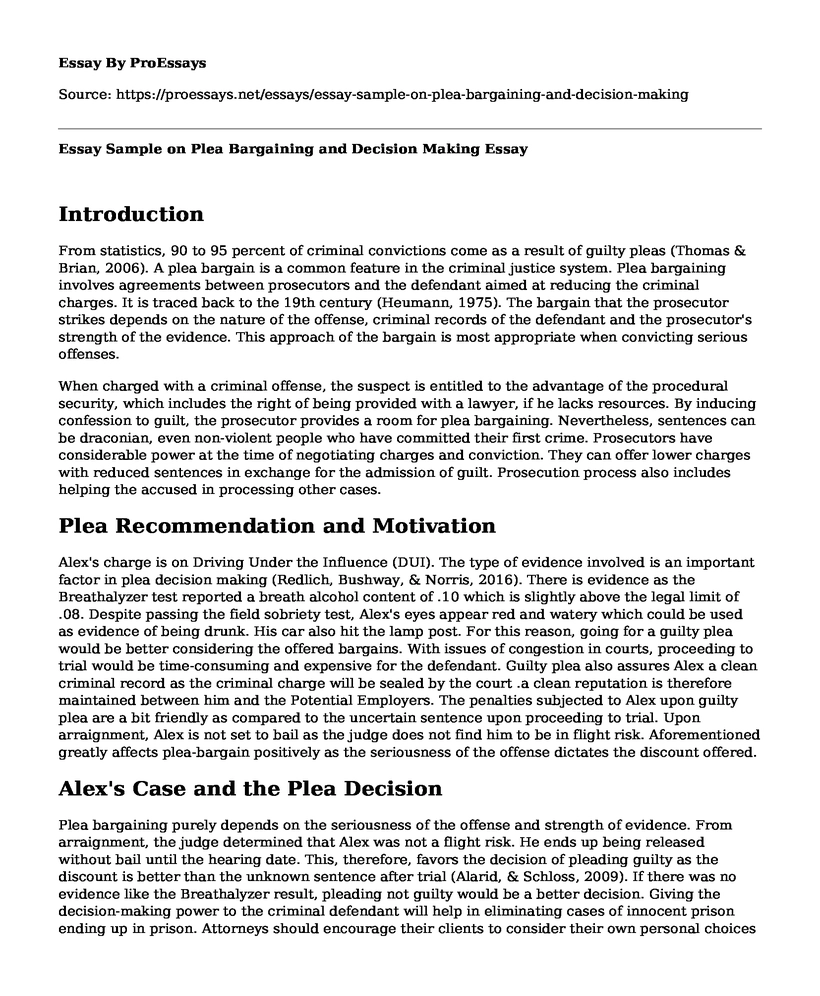Introduction
From statistics, 90 to 95 percent of criminal convictions come as a result of guilty pleas (Thomas & Brian, 2006). A plea bargain is a common feature in the criminal justice system. Plea bargaining involves agreements between prosecutors and the defendant aimed at reducing the criminal charges. It is traced back to the 19th century (Heumann, 1975). The bargain that the prosecutor strikes depends on the nature of the offense, criminal records of the defendant and the prosecutor's strength of the evidence. This approach of the bargain is most appropriate when convicting serious offenses.
When charged with a criminal offense, the suspect is entitled to the advantage of the procedural security, which includes the right of being provided with a lawyer, if he lacks resources. By inducing confession to guilt, the prosecutor provides a room for plea bargaining. Nevertheless, sentences can be draconian, even non-violent people who have committed their first crime. Prosecutors have considerable power at the time of negotiating charges and conviction. They can offer lower charges with reduced sentences in exchange for the admission of guilt. Prosecution process also includes helping the accused in processing other cases.
Plea Recommendation and Motivation
Alex's charge is on Driving Under the Influence (DUI). The type of evidence involved is an important factor in plea decision making (Redlich, Bushway, & Norris, 2016). There is evidence as the Breathalyzer test reported a breath alcohol content of .10 which is slightly above the legal limit of .08. Despite passing the field sobriety test, Alex's eyes appear red and watery which could be used as evidence of being drunk. His car also hit the lamp post. For this reason, going for a guilty plea would be better considering the offered bargains. With issues of congestion in courts, proceeding to trial would be time-consuming and expensive for the defendant. Guilty plea also assures Alex a clean criminal record as the criminal charge will be sealed by the court .a clean reputation is therefore maintained between him and the Potential Employers. The penalties subjected to Alex upon guilty plea are a bit friendly as compared to the uncertain sentence upon proceeding to trial. Upon arraignment, Alex is not set to bail as the judge does not find him to be in flight risk. Aforementioned greatly affects plea-bargain positively as the seriousness of the offense dictates the discount offered.
Alex's Case and the Plea Decision
Plea bargaining purely depends on the seriousness of the offense and strength of evidence. From arraignment, the judge determined that Alex was not a flight risk. He ends up being released without bail until the hearing date. This, therefore, favors the decision of pleading guilty as the discount is better than the unknown sentence after trial (Alarid, & Schloss, 2009). If there was no evidence like the Breathalyzer result, pleading not guilty would be a better decision. Giving the decision-making power to the criminal defendant will help in eliminating cases of innocent prison ending up in prison. Attorneys should encourage their clients to consider their own personal choices when it comes to issues of decision-making. Plea decision making is mainly influenced by factors like the probability of conviction, nature of the possible sentence, types of evidence and availability of confessions or evidence from eyewitnesses. Research has proven that jurors value some kinds of evidence over others. There are two categories of evidence, direct and circumstantial. Some factors like juror altitudes and demographics affect the trial and plea decisions.
References
Thomas H. Cohen & Brian A. Reaves, Bureau of Justice Statistics, US Dep't of Justice, (2006). Felony Defendants in Large Urban Counties.
Heumann, M. (1975). A note on plea bargaining and case pressure. Law & Society Review, 9(3), 515-528.
Alarid, L. F., & Schloss, C. S. (2009). Attorney views on the use of private agencies for probation supervision and treatment. International journal of offender therapy and comparative criminology, 53(3), 278-291.
Redlich, A. D., Bushway, S. D., & Norris, R. J. (2016). Plea decision-making by attorneys and judges. Journal of Experimental Criminology, 12(4), 537-561.
Cite this page
Essay Sample on Plea Bargaining and Decision Making. (2022, Jul 25). Retrieved from https://proessays.net/essays/essay-sample-on-plea-bargaining-and-decision-making
If you are the original author of this essay and no longer wish to have it published on the ProEssays website, please click below to request its removal:
- Criminal Law Story by the Canadian Press
- Benefits of Public Surveillance Cameras Essay
- Criminals Risk Attitudes According to Criminology Literature
- The Juvenile Justice and Delinquency Prevention Act: Protecting Youth from Risk in Adult Detentions
- Essay Sample on Juvenile Justice: From Punishment to Rehabilitation
- Essay Example on Gun Control: A Divisive Political Issue in the US
- Essay Example on Supreme Court Challenges Federal Regulation on Wetlands Isolation







